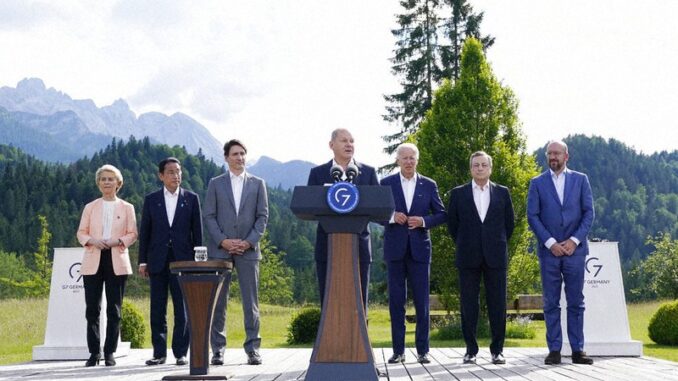
The Group of Seven nations, a bloc of the world’s leading industrial states, are edging closer to formulating a mechanism which will cap the price of Russian oil as they look to squeeze Moscow’s oil and gas revenues, according to a June 27 briefing by the US government.
In a White House briefing, a senior official from the US government said G7 leaders were very close to developing a “global price cap for Russian oil in shipments” to countries outside of the U.S., EU, the UK, and the broader G7.
“The goal here is to starve Russia — starve [Vladimir] Putin of his main source of cash and force down the price of Russian oil to help blunt the impact of Putin’s war at the pump,” the official added.
G7 leaders are keen to take more measures to cut off Kremlin’s financing of its invasion of Ukraine.
Despite many energy sanctions Russia, the country’s revenues from oil and natural gas trade have been not as impacted as the West would have liked. Russian oil exports have remained at elevated levels, and oil prices have continued to be very high affecting the global economy.
On June 26, European Council President Charles Michel confirmed that G7 was discussing a proposal involving “a technical mechanism which would have the effect of a cap especially of the services related to oil like transport, insurance.”
“Russia’s war against Ukraine has put the world at risk dramatically impacting food and energy supply, prices and inflation,” Michel said at a press conference, admitting that more steps needed to be taken “to cut oxygen from Russia’s war machine.”
The G7 meeting, which is taking place in Schloss Elmau Germany, started on June 26 and will conclude on June 28.
Targeting Russian oil revenues
A price cap would be enforced by US secondary sanctions, under which the Treasury Department could target any bank or shipping company involved in deals for oil that exceed that cap.
Edward Fishman, who advised sanctions policy in the Obama administration, has pushed the price cap as the best solution to cutting off Russian oil revenues while major oil consumers continue to import significant Russian volumes.
He suggested a price at the marginal cost of production, which he estimated at $30/b.
“Why would India, China, Turkey, whoever comply with this?” he said. “Mainly because there’s not just a negative incentive, which is the threat of sanctions, there’s a massive positive incentive: Buying oil at $30/b. That sounds amazing, right? … This would be significantly beneficial to the Chinese and Indian economies.”
Biden is urging G7 leaders to adopt a price cap mechanism to squeeze Russian oil revenues and to curb global oil prices that have supercharged US inflation and increased political pressure ahead of the US midterm elections.
“The dual objectives of G7 leaders have been to take direct aim at Putin’s revenues, particularly through energy, but also to minimize the spillovers and the impact on the G7 economies and the rest of the world,” the senior Biden official said.
Biden is also urging G7 leaders to expand targeted sanctions to further restrict Russia’s access to key industrial inputs and to align tariffs on Russian goods to help Ukraine, the White House said. He plans to announce that the US will implement a higher tariff rate on more than 570 groups of Russian products worth $2.3 billion.
Source: Spglobal.com



